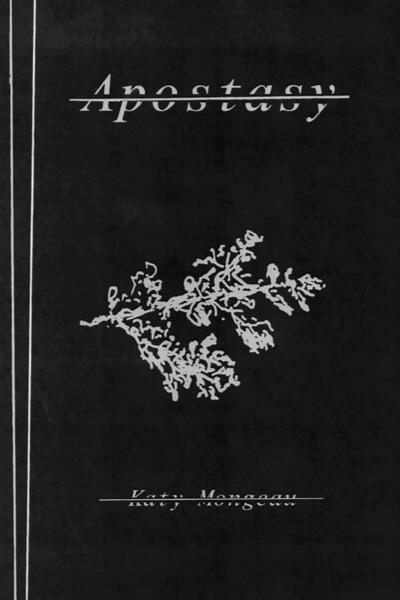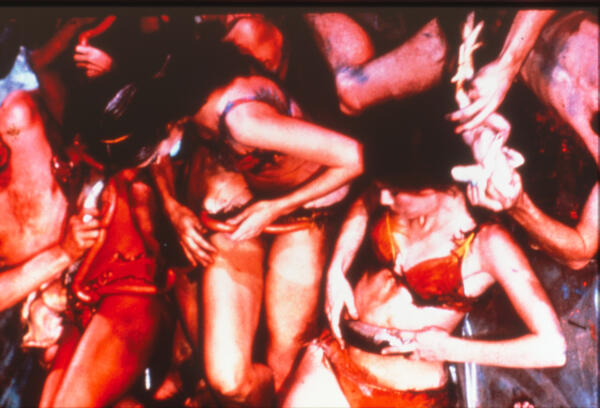
“When you murdered me, I called it apostasy,” announces the speaker in Katy Mongeau’s debut collection Apostasy. With its “mutilated visions” of wicked lambs, apocalyptic suns, and homicidal lovers, Mongeau’s book marks out a harrowing territory between the corpse poem and the murder ballad.
In “Apostasy,” the first of the two long poems that make up the book, Mongeau dramatizes the poetic speech act—in the tradition of Emily Dickinson—by locating these utterances in the grave. For instance, we might hear the echo of “I heard a Fly buzz – when I died” in the book’s opening line: “The difference between the black birds / and the black flies was only the distance / from my lazy eye.” The poems in the “Apostasy” section are sparse, often displaying only a few lines per page, which creates the sense that the speaker is exerting immense effort to produce a voice.
The driving force in “Apostasy” is the consistent address to a figure who seems to be simultaneously the object of the speaker’s desire and the instrument of the speaker’s demise. The result is a complicated kind of apostrophe that grants the dead speaker the power of address and silences the possibly still living addressee. The tone of this address wanders unpredictably between tenderness and violence, exemplified in lines like “I am sick and I just want to be quiet with you / flaying you, / Love.” It is this fraught relation between the speaker and the “you” that constitutes the “apostasy” of the title. Again echoing Dickinson, the “little house” of the grave is equated to domesticity as “[t]ogether, we planned to ban the domain of the / living. We tried to reconcile / the private, natural world.” The poem ends in an elegy, as the speaker mourns not her corporeal self, but a lost innocence of perception:
You wished to drown the
act of drowning. You wished to silence silent
forces. I glee-fully followed suit. Colorblind, I
lost sight of the wonderfully complex essence of
the world before and behind me.
The second section, “Hostia,” is written exclusively in prose blocks and contains a more recognizable narrative thread. The poem articulates sexual initiation through the language of sacrifice and ritual consumption. Here, the speaker refers to herself variously as “lamb,” “veal,” “foie gras,” and “lemon-bleached for tender.” Her “one dumb opulent wish” is to be consumed, “my blood pluming on your teeth.” The unsettling proximity of culinary and sexual language in this section is reminiscent of works like Carolee Schneemann’s Meat Joy performance or Hermann Nitsch’s Orgies Mysteries Theatre.

Caroline Schneemann’s Meat Joy (1964) 16mm
Whether the utterance arrives from beyond the grave or from a speaker preparing for “butchery or stuffing,” consumption and sacrifice occupy a central position in Apostasy. From one angle, these domains might appear to deal in loss. Apostasy subverts this expectation by diving into a kind of sacrificial excess in protest of the “great tax on ecstasy.” As Diana Fuss points out in Dying Modern: a meditation on elegy, “Corpse poems, unlike elegies, strive to reconstitute death, not to compensate for it. The corpse poem is not a substitute for loss but a vehicle for it, not a restitution for loss but a means to achieve it.” Against compensation, Mongeau’s poems suggest that loss is its own kind of presence, that even the traumas of sacrifice, death, or heartbreak generate an unassimilable substance: “You can be ruined, but not empty. You can be a temple, but not empty. You can be a ruin, but not nothing, no.”
Zack Anderson holds an MFA from the University of Notre Dame. His book reviews appear in American Microreviews & Interviews, Harvard Review, and Kenyon Review. His poems have recently been published in Fairy Tale Review, The Equalizer, White Stag, and others. He currently lives in Athens, Georgia where he is a PhD student at the University of Georgia. @ZackAanderson